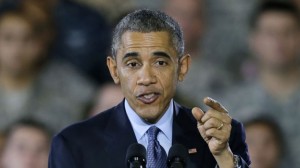
Obama pushes military frustration to highest level in decades
Key lawmakers from both parties say frustration with the White House among the top military officers is at its highest level in decades, the product of President Obama’s cautious approach to the wars in Syria and Iraq and an indecisive inner circle of White House advisers who, critics say, have iced the Pentagon out of the policymaking process.
“There’s a level of dissatisfaction among the uniformed military that I’ve never seen in my time here,” said Senate Armed Services Committee Chairman John McCain in an interview. “For some of us who are a little older, let’s go back and read the Pentagon Papers — what the administration is doing is the kind of incrementalism that defined much of the Vietnam conflict.”
The Arizona Republican is known as a fierce critic of President Obama’s foreign policy, but his complaints were echoed by an unlikely source: Rep. Adam Smith, the ranking Democrat on the House Armed Services Committee.
“Frustration among the uniformed service is real,” the Washington Democrat said, adding that the administration “does keep things in the White House and has not been more inclusive in the decision-making process.”
But Mr. Smith also defended the administration’s overall approach to the troubled Middle East, arguing that the “sheer complexity of the situation” following the Arab Spring and the rise of the Islamic State — also known as ISIS — have defied a simple U.S. solution. “I don’t think dropping 50,000 U.S. troops down is going to fix the situation,” he said.
Both lawmakers made their comments in interviews with The Washington Times this week ahead of Saturday’s third annual Reagan National Defense Forum, a summit expected to feature much soul-searching about America’s current role in the Middle East and beyond among officials and analysts from both inside and outside the administration.
The event, held at the Ronald Reagan Presidential Library in California, aims to “provide clarity to the debate in a setting outside Washington,” according to Reagan Foundation Executive Director John Heubusch.
Defense Secretary Ashton Carter will be there. So will Homeland Security Secretary Jeh Johnson, a long with a host of lawmakers from both sides of the aisle and such former George W. Bush administration officials as Condoleezza Rice. While Mr. Heubusch told The Times that the hope is “to create a dialogue without partisanship,” he also said a key underpinning of the forum is to get people reflecting on what Ronald Reagan became known for more than anything else in his time in office — his success in bringing an end to the Cold War.”
“And he did that,” Mr. Heubusch said, “through his whole peace through strength strategy.”
Mr. Smith said Republican leaders deserve a fair share of the blame for the polarized debate because of what he said was political posturing against nearly every aspect of President Obama’s Middle East policy.
Some of the attacks are so derisive, he said, that they have effectively crippled the prospects for serious national security discussions on Capitol Hill.




